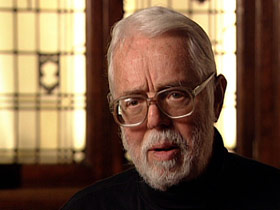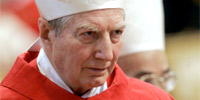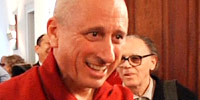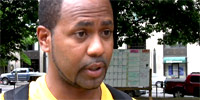In This Episode << SLIDE LEFT TO SEE ADDITIONAL SEGMENTS
Harvey Cox Extended Interview
Read more of the November 17, 2006 R & E interview with Harvard professor Harvey Cox:

Atheism comes and goes in human history. It always makes a comeback, I think, when religious people get too arrogant, when they begin to look as though or speak as though they know it all, when they begin to impose themselves in ways that are unwelcome to other people in the society. Then atheism is a kind of, for me, welcome critique of this arrogance. Religion has always had a terrible temptation to become arrogant, to claim to know more than it knows, and I think atheism is kind of a purging, cleansing necessity for religion. It comes and goes. Now, given the fact that we have so much overstatement and hyperbole by many religious figures, and religion is riding high in some places, naturally you are going to have this kind of response. I think it’s a healthy thing. I think the dialectic that works here is an excellent one, so I don’t decry it. I think it’s a welcome development.
[It’s a reaction to] not just the religious right, but any kind of religious institution or spokesman that is claiming more than religion can legitimately claim. I think humility ought to be one of the marks of any authentic religion. We don’t see a whole lot of humility on the part of many religious people now, or religious institutions, and I think that evokes a kind of legitimate criticism. After all, if we are talking about God, we are talking about a reality that nobody can really define — the unfathomable, the unnamable. I mean, Jews have insisted that we don’t even use the word “God” because it raises the danger that it might be used in an illegitimate way. I’ve always thought that was a very wise provision in Judaism. Humility is at fairly low ebb now because religion has had a sort of a comeback in the last 30-40 years, when everybody said it was maybe going downhill or it was going to be [marginalized] or it wouldn’t be as important. Now that we have had this comeback, and whenever you have a comeback of religion, you have misuse and excess that carries with it and that calls for some kind of a critique.
I welcome [secular humanists to public policy debates]. Why not? I mean, this is a free country. I once said this about Jerry Falwell. Someone said why doesn’t he get out of politics? I said, look, I was and continue to be involved in politics and social concerns as a Christian. I don’t want to exclude anybody from the arena. I think it makes it a richer, more diverse, more interesting conversation that we are having. I don’t think secular humanists represent a whole lot of people. If I were a congressman, I would be pretty careful about courting the secular humanist vote. I don’t know how many they are. Nonetheless, they should be part of the conversation, sure.
The attempt to impose particular ideas of what science should be doing or not doing, based on somebody’s religious convictions, ought to be questioned. If they want to do that nobody’s going to stop them from advocating that. But I don’t want to rule anybody out of the public sphere. I really don’t. It’s a pluralistic country. We have different religions. We have people who are religious in different degree; we have some secular humanists. And that’s what makes it interesting. I think they all ought to be encouraged to be part of what we call a pluralistic democracy.
I met [Richard Dawkins] when he spoke at Harvard last year. I think of Richard Dawkins as the kind of Jerry Falwell of the atheists. In a way, he’s a kind of fundamentalist. I will explain why. He takes the most narrow and the most legalistic side of religion and makes that religion, and then he’s against it, whereas Jerry Fallwell takes the most legal and literalistic side, and he supports it. But in a way curiously they agree with each other. The fact is that when [Dawkins] was here [at Harvard] he was a bit of an embarrassment. I think it was the secular humanist students who brought him here. He was so unsophisticated in a way, so wooden and, yes, literalistic. Let me say it this way, and all due respect to him: I wish we had a higher quality of atheistic writing. I would welcome it. That would make for something, but no, it’s not even very interesting and certainly not a challenge to the most sophisticated and thoughtful kinds of theology we have. [Dawkins] is a literalist, and I think literalism is the enemy of religion, and carried to excess it’s a kind of fundamentalist closing in. I think he’s taken that particular version and made it his punching bag. It’s a conversation that I think most thoughtful people who are critical of religion or who are in favor of religion just can’t connect with.

Most of our Western moral tradition, the main contours of it have emerged from the Jewish and Christian tradition. We have them institutionalized now in many ways. They are there, and a lot of people affirm them who are not religious. I think for many people religion is the basis of their morality, but there are obviously very moral people, ethical, thoughtful, sensitive people who are not individually religious themselves. For them, a particular, individual faith is not the basis of their morality, so you can’t make a general statement that it always is.
The Enlightenment is a very complicated movement. We never have figured out exactly what all is included in the Enlightenment. It was in some ways an extension and growth of the Western Judeo-Christian tradition with many, many criticisms of it built in. In a way, it was parallel to the Reformation — two movements that both cleansed and purged the religion at the time of its excesses and excess claims. The Enlightenment tradition went into the foundation of American society as well. It’s still here among us, with human rights and equality and things like that, which I certainly defend. They came to the fore through the Enlightenment. Obviously, there are people who can derive their values from these traditions. It would be empirically inaccurate to say otherwise, of course. There they are, and we know them. They are our friends and neighbors and colleagues and all the rest, and we work together, and we can agree on a lot of things even though the underlying basis for our morality might be different.
It’s too bad [that some people can’t believe in anything they can’t prove], because they are going to run into a lot of things in life that they can’t prove that they have got to deal with. I mean things like love, for example. I don’t think that there is a really serious battle to be fought anymore, if there ever was, between science and religion. I used to teach a course here [at Harvard] with Stephen Jay Gould, one of the great scientists of our era, one of the finest colleagues I’ve ever had. Alas, he died two years ago, but we taught a course together, and I learned a lot from him. One of the things I learned was his insistence that science should do what it does.
It describes, it can predict to some extent, it measures. But science as science cannot make decisions, for example, about how its findings should be applied — that is not within the scientific method — or which project to take on next. If it’s going to cost $20 million, should you do it or should you not do it is a question, as science, it can’t decide on. The thing that we agreed on is that when religion and science both do their thing and don’t step over the boundary and try to do what the other is doing, it can be a mutually enhancing process. It’s when they step over and scientists say there isn’t any God because, look, we can’t prove him. Well, the canons of proof are not applicable to that question, and it’s just not something that can be proved or disproved. Or when theologians start making statements about the age of the Earth or something like this, which they have no competence to make. I think we are at the age of a new cooperation, a mutuality between science and religion. When I talk to my younger scientific colleagues at [Harvard] they are all eager for this conversation to go on. For some reason, there are just some people who haven’t gotten the word yet and are still fighting these old battles.
[Religion] certainly has done a lot of harm, as have many other things — governments and science. There’s hardly an institution in the world that hasn’t done an awful lot of harm. But how could you possibly measure all the little things that are happening all around the world, as we speak, that are motivated by people who have a simple or even more complex religious faith? They are helping their neighbors, they are opening soup kitchens. Just think of all these things these people are doing. Now, how do you possibly measure that? It can’t be measured. Then there are all these horrible things that are done that we all know about in the name of religion today. I don’t see how that can possibly be added up, weighed one way or the other. I wouldn’t even assay an answer.
How can there be a loving God when there is so much bloodshed, period, in the name of anything, nationalism or something else? Of course, that’s a very old question, and different religions have different responses to that. In Christianity, for me the most plausible answer is that God shares as a victim of the bloodshed. God is not inflicting it. It’s human beings who are doing this, and in Christianity we believe that God has made the decision to share in the worst elements: the suffering, the deprivation, the humiliation, indeed the death that goes with us as human beings. We can’t ascribe this kind of cruelty directly to God. That’s an understanding of God that I think simply has to be thrown out. When I meet somebody who says, “I don’t believe in God,” I say, “Describe the God you don’t believe in. I probably don’t believe in that God either,” so we can start out with that sort of agreement.
The main function of religion, I think, is to provide a sense of meaning, purpose and the kind of values that derive from that meaning. There are, of course, alternate ways of discerning meaning in life, but this, I think, is the major contribution that religion makes. So people who don’t have anything like this, any sense of purpose or meaning, I don’t see how their purpose fits into something larger. They really have to swim on their own, and it’s a tough swim.
I haven’t noticed [a trend toward atheism.] Students now are enormously more interested in religion, in studying religion, asking religious questions, taking courses, participating in religious institutions [than when I first came to Harvard]. The only trend I see is the other way. But obviously there are people out there buying these books, so I don’t know.
There are some enormously fine and moral people who are not believers. Most of them that I would get along with more easily would call themselves agnostics. They would say, “Look, quite honestly, I don’t know.” An atheist seems to me a person who has searched out and thought about all the options and insists there isn’t any God or anything like God, and I know that and no further evidence is going to change my mind. That seems to be leaning toward the same kind of arrogance that some religious people have, and I’m troubled by that. We do have to remember that within the memory of some of us there was a whole country, an empire, built on an atheist premise, namely the Soviet Union, which was really trying to get rid of all religion, and they were certainly as capable of cruelty and oppression as any religious regime. I’m afraid that kind of capacity in human beings is equal-opportunity depravity, which atheists and religious people and others have demonstrated that they can share as well. I wouldn’t want my kids taught by a radical fundamentalist either, but also not by an arrogant atheist. A nice atheist or an agnostic, a good person — fine. I just don’t like the kind of arrogance and “my way is the only way to see things” attitude that you find both in religious and nonreligious people.
Atheism will ebb and flow, I’m sure of that. I was at a wonderful meeting about five years ago in Milan organized by Cardinal Carlo Martini. He was later in the running for pope. He didn’t win, in my mind unfortunately. A wonderful man, a Jesuit. Each year he had a big event in Milan which he called “the lectures for unbelievers.” Anybody could come, and hundreds and hundreds and hundreds of people came. I was one of the speakers there a while back. Cardinal Martini came in fully dressed in his cardinal’s robes and bishop’s vestments and so on. He said, “When I talk about unbelievers I’m not talking about some people as opposed to me or other people. There is something of the unbeliever in all of us, including me.” This was a prince of the church, a possible future pope. All of us have something of the unbeliever and, he said, “I believe unbelievers have something of the believer in them.” It’s not that black and white. It’s a shifting picture, and I fully expect that it’s going to continue to be that way.
An element of doubt has to be part of any healthy faith. Otherwise, it’s credulity, it’s not faith. Throughout the Bible there are people who question. Think about Job, but other people as well, throughout the Old and New Testament who are questioning and doubting and pondering things. I think it’s a necessary element in any healthy faith.







